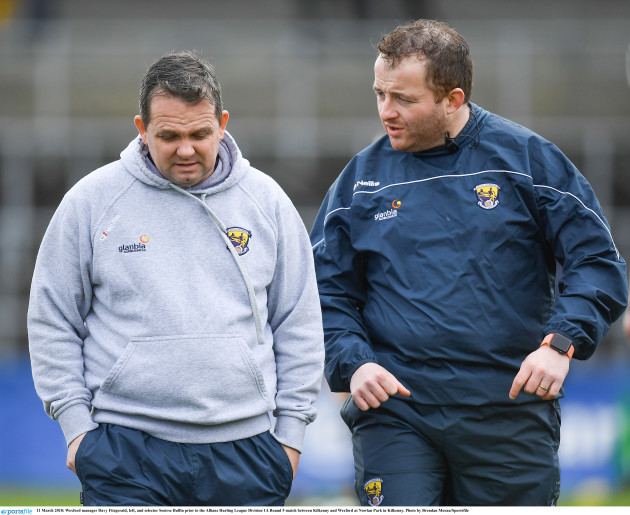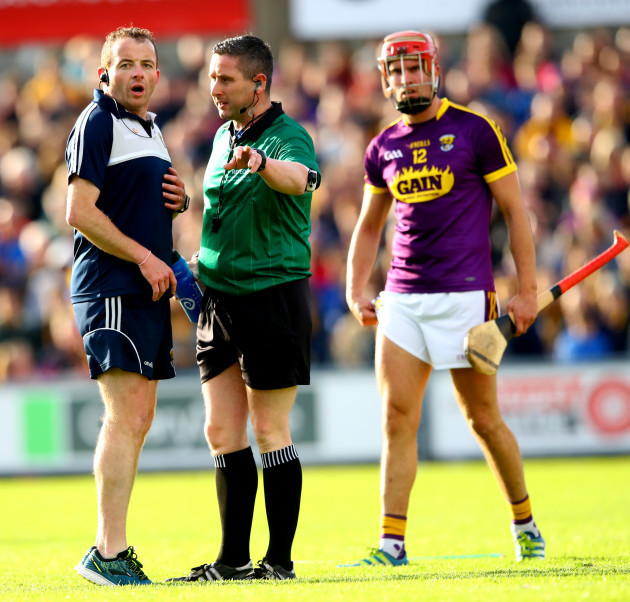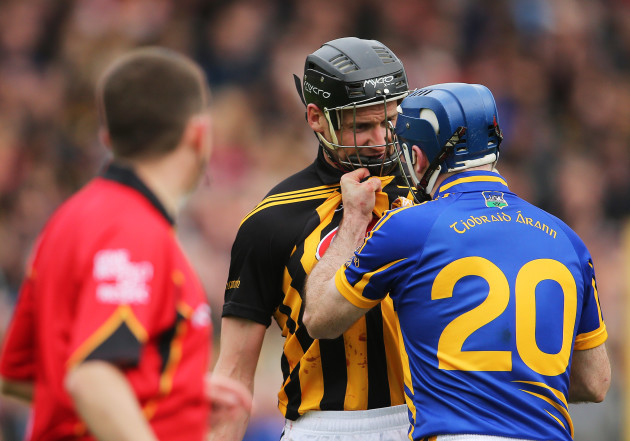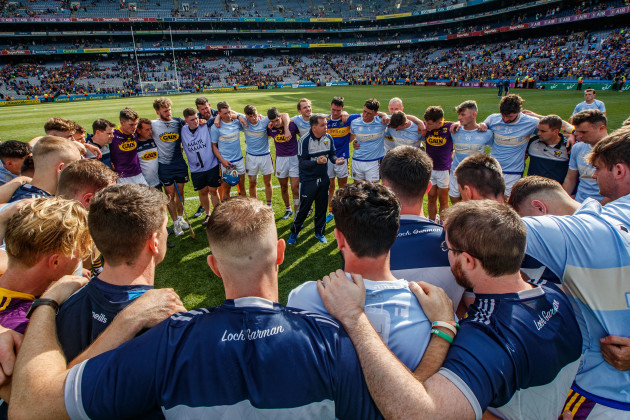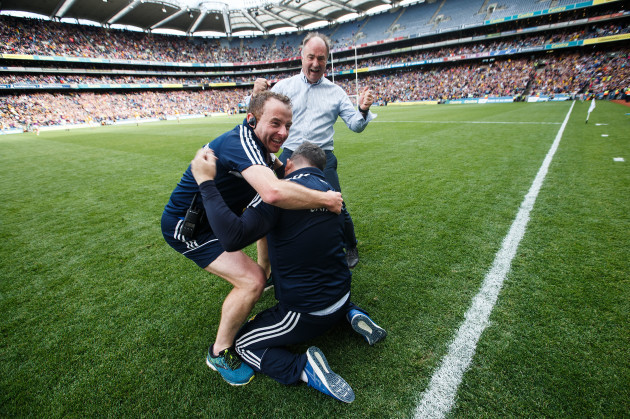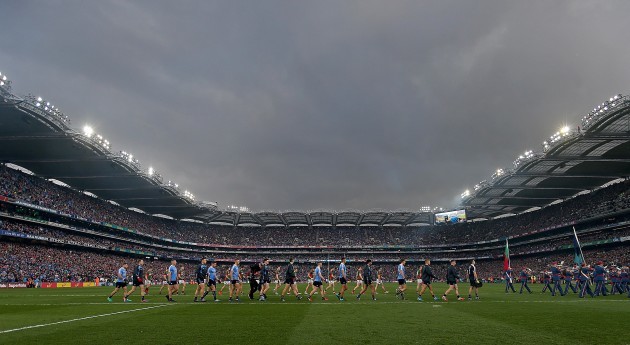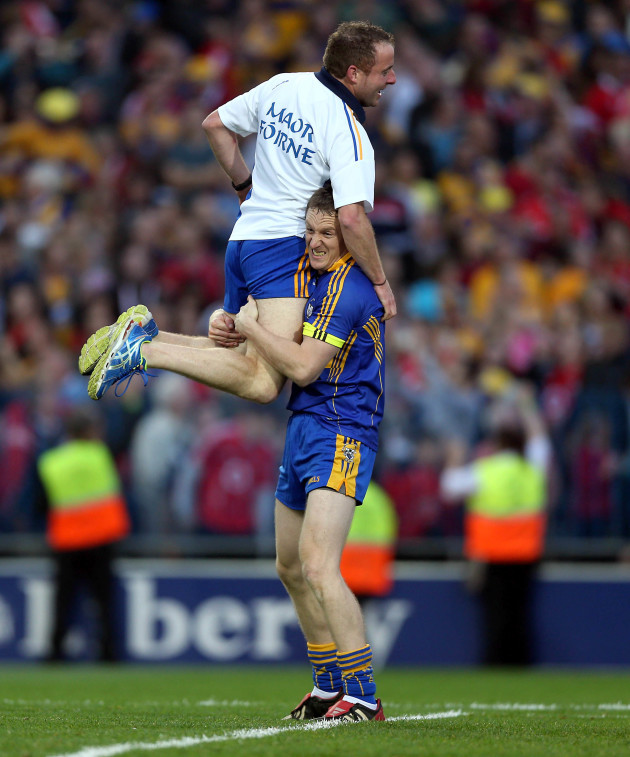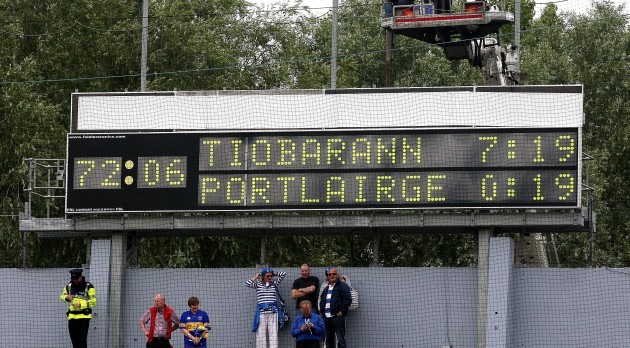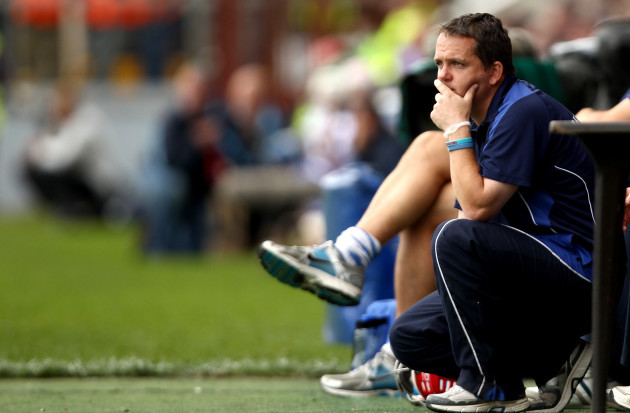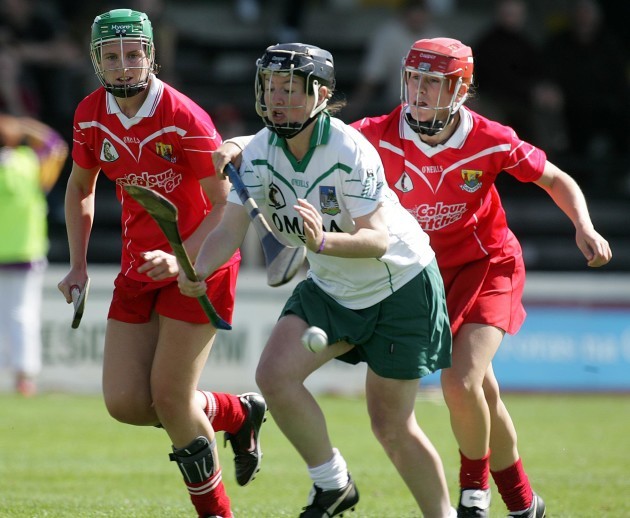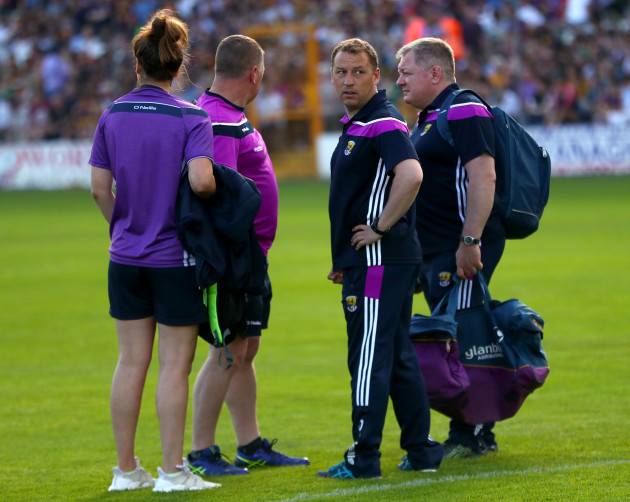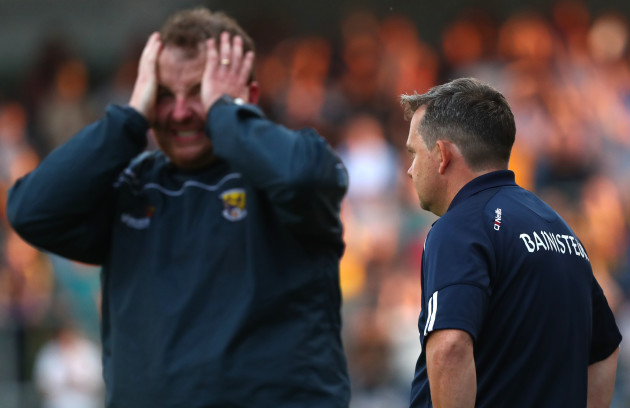THIS IS THE second installment of our two-part coaching series which aims to learn about the modern inter-county coach. Last week, we spoke with Meath football coach Colm Nally – and you can read that piece here.
*************************
Our subject this week is Wexford coach Seoirse Bulfin, who has been Davy Fitzgerald’s trusted lieutenant since they first met in LIT in 2003.
Hailing from the Bruff club to the south of Limerick city, Bulfin played in goals for Limerick minors in 1997 and captained Mary I in the Fitzgibbon Cup in 2003. He continued to represent his club at senior level up until 2017.
By the time he finished college, he was already immersed in coaching.
After graduating from Mary I the same year, Bulfin managed to land the role of GAA development officer in Limerick IT which brought him into contact with Fitzgerald for the first time.
Together they led the college to Fitzgibbon titles in 2005 and 2007, before joining forces again in Waterford in 2011. When Fitzgerald was appointed Clare manager in 2012, he brought Bulfin on board as part of his backroom team and the pair were on the sideline when the Banner lifted the Liam MacCarthy Cup the following year.
Over a colourful coaching career, Bulfin also managed Ballyagran camogie team to the Limerick senior championship title in 2011 which ended a 30-odd year famine, while the team was captained by his wife Sharon, the former Limerick player who is the sister of Treaty legend Andrew O’Shaughnessy.
In recent years, Bulfin has been coach with Wexford which involves embarking on those six-hour round trips to their training base in Ferns. They delivered the Leinster title this summer, an achievement that Bulfin rates as his most memorable in the game.
*************************
1. How did your interest in coaching begin?
“I would have started coaching at a very young age. My dad (Tom Bulfin) was a primary school teacher and he brought me up to the field. I was coaching the six and seven-year-olds from when I was 12 or 13.
“The big break, for want of a better word, was I went to UL for a year and didn’t like it at all. So I switched courses and went back to Mary I. I was doing first year of a new course again so I wasn’t eligible to play Freshers.
“Noreen Lynch, who died last year and was way ahead of her time from a female coach’s point of view, asked if I would take the Fresher’s team. So that was my first high level coaching assignment. I was coaching my own peers, my own age group, so that was where I really started coaching. That was in ’98 or ’99. From there on in, I was coaching some team or other.”
2. Your father Tom was Limerick coach with Phil Bennis back in the 1980s and early 1990s. Was hurling constantly being discussed at home when you were young?
“Oh the whole time. I’m from a big GAA background. When Limerick last won the minor in ’84 he was a selector with Phil Bennis. And he was a selector in ’87 when they won the U21. When they won the National League in ’92 he was with Phil Bennis too.
“So even as a child, I’d have been going to matches. I’m have been head next to heels involved in hurling. I would have seen Phil Bennis in operation from a very young age. There were so many similarities between Phil Bennis and Davy Fitz at times. Myself and Dad would often discuss it, he’d be telling stories. ‘Tis frightening how similar they are.
“Phil was definitely ahead of his time. They only got two years with the senior team in Limerick and I’d still argue that if they got the third year I’ve no doubt they would have won the All-Ireland in ’94. 100%, I’d be adamant of that.
“The way the system was at the time, in the very first year they won the league, the following year they were beaten by Clare in the first round and that was that effectively then. The county board felt it was time for a change in management after two years and Tom Ryan was brought in. So we’re constantly talking about hurling.
“My father is a retired principal now but he goes back into the school every Tuesday for a whole academic year and takes kids hurling for the afternoon. The different I find now is I have three small kids of my own, three girls, and I’d find it very difficult to coach children now.
“And I keep telling the lads at home, ‘You’ve to be able to coach children.’ When the likes of Lee Chin turn up to a session, they’re easy to coach but mother of God trying to coach kids now is torturous because it’s a different level altogether. You’ve to be able to coach, you’ll bluff the likes of Lee Chin but you won’t bluff a six-year-old girl – trust me on that!”
3. What was the highlight of your playing career?
“I captained the Fitzgibbon Cup team in Mary I in 2003. That was big. Playing minor for Limerick would have been a huge honour for me. It would have been as good as it got for me from a playing point of view.
“Some of the other things, winning a south intermediate title with Bruff was a huge achievement as well. That would have been a huge thing, big crowd. I remember making a save, one of the last plays, it was an important save – a one-on-one kind of thing that swung the game. So that always sticks in my mind.”
4. What did you study in college?
“I did Law and European Studies in UL which wasn’t for me. So I went across to Mary I for the four years and I did Arts with a view to go into secondary teaching. It was history and geography that I was doing.
“I graduated out of Mary I in May 2003 and within a few weeks a job came up as a GAA development officer in Limerick IT. So I was just out of college and I gave in my name for it. I didn’t dream I’d get it. I got the job and I’m in LIT since.
“The plan was to do a couple of years as the development officer and maybe go back and do my HDip and go secondary teaching. In the meantime, while I was in LIT I did a Masters and I’m lecturing here now for the last five or six years. That’s my career path.”
5. As a hurling-mad fella in your early-20s, you must have been delighted to get the role of LIT development officer.
“I was thrilled, it was fantastic. I came in and it coincided with Davy Fitz taking over the Fitzgibbon team here and all of a sudden, I wasn’t that much older than Jackie Tyrrell, Eoin Kelly and these guys, and I was surrounded by the young superstars.
“It was like Christmas morning every day watching these guys train, watching them hurl. At that stage, I was really only involved in the admin side of things with the Fitzgibbon. I was doing a little bit with Davy and then as the year progressed I was doing more and more of the coaching and stuff.
“You get a lot of breaks in your life and for me, I got very lucky at certain stages. That’s the way I would see it. From the point of view I was lucky. A lot of coaches wouldn’t get the breaks I got.
“I was very lucky to come into LIT when Davy was coming in and I started working with Davy. I went in watching the likes of Eoin Kelly, Jackie Tyrrell, Fraggie (Kieran Murphy).
“We had a couple of phenomenal years, we had Joe Canning, Conor O’Mahony, Shane McGrath – jeez I was pox to kind of learn my trade with some of the best young hurlers in the country.”
6. What was the idea behind those famous early morning training sessions at LIT in the freezing cold and biting wind?
“There was a very practical side of it from a college point of view. It wasn’t just to test them, it was literally to give guys a free run at the day then from the point of view of their studies. That was one aspect.
“The second thing was you were getting guys to buy into something to push them out of their comfort zone. It’s something you kind of have then as the year progresses, you can say, ‘Look at what we have in the bank. Look at the effort we went to. Not many teams will have made those sacrifices.’
“You’re just building on that. You’re banking a certain amount of stuff you can come back to when times are getting tough maybe in competition and stuff. And you also get a real test of the guys that you’re working with to see what they’re like.”
7. Davy Fitz had a great quote about the Wexford players after the Leinster final where he said, ‘If I told you what I put them lads through, you wouldn’t believe it.’ Is that the same principle? You can keep referring back to those tough training sessions at difficult moments in the season?
“That’s the big thing. You can keep referring back to it, that the work has been done, you’ve put in the work.
“Now it’s like anything, it’s no more than any other team at that level would have done, but it’s still nice to say, ‘Listen, we’ve all been through this, we’ve all had a lot of hard times, we’ve worked very, very hard to get where we are’. And you keep drawing on that. It’s sort of part of the psychological training of a team more than anything else.”
8. You have a Masters in psychology from Waterford IT. Is that a big area of interest for you?
“I’d be hugely into it. I could even tell you the exact moment when I got interested in sports psychology and Wexford were actually involved. It was the 1996 All-Ireland final and I was a teenager sitting in the lower Cusack as a Limerick supporter. After about 20 minutes or so, I’ve looked back on it on Youtube but I can’t remember the exact time.
“I was a goalkeeper and (Wexford keeper) Damien Fitzhenry had gotten very little ball. Mike Houlihan hit a line ball from in front of the Hogan Stand from about 80 yards out. It just took off like a rocket. I’ve often spoken to goalkeepers about this, one of the hardest balls to deal with from a goalkeeping point of view is a line ball because it’s swirling and it’s dipping.
“This one was coming in at about crossbar height like a missile. And Fitzhenry just put up his hand, plucked it out of the sky and bate it down the field. And at that stage, I was maybe 15 or 16, and I used to get very nervous before games.
“I remember thinking, ‘What kind of mindset must you have in the most important game of his life just to literally – bang, put the hand up with no fear of him dropping it or anything like that?’
“The psychology behind sport and performance, it was literally down to the genesis of that idea for me. When I got the chance to do the Masters, I found it fantastically interesting. I did it in WIT and I’m doing my PhD in it in Mary I now.
“Now that’s going to take a long time and you’re trying to mix it with work and family and Wexford and everything, so yeah that’s my next level now. I don’t have much done but I’ve a year done on it.
“John Perry, who is my supervisor, is the Dean of Arts in Mary I and he would have worked with soccer teams and stuff. So I’ve a huge interest in the psychology of sport and performance.”
9. When you’re working with players on psychology, do you mainly do it on an individual basis or in a group setting?
“At the moment, I’m all about the coaching. My argument is you can’t go in and do both – you can’t be a jack of all trades. Now, guys will come and talk to you and stuff, there’s no problem with that.
“I remember one of the years in Clare, Fitzy said, ‘Do you want to do the psychology?’ I said, ‘I won’t. I’ll either go coaching or I’ll do the psychology.’ I think you’re devaluing both positions if you’re trying to do both.
“Every now and again you’ll get a call from a team saying, ‘Listen, they have a county final or a relegation final, will you come in and talk to them?’ On a one-off like that, I’ve said to them, ‘If you felt they were unfit, would you bring in an S&C coach for one session before a game?’
“You wouldn’t and I think a lot of the group stuff doesn’t work a whole pile. I’ve said it to anyone that’s practising sports psychology, you’re better off to try and embed yourself with the squad – whatever the sport is – and try get to as many training sessions and meet guys individually.
“Now four or five of those group sessions every year are grand but if you’re doing one or two talks over the course of 12 months, lads are going to get very little out of it. I would say you need a psychologist who’s just like an S&C coach or dietician.
“That’s the point I’d make, you’re not going to bring in an S&C coach three or four times a year for a squad and hope for the best for the rest of the year.”
10. Do you keep a notebook or diary where you jot down drills or ideas?
“I would and would you believe I just doing a coaching skills class with first years this morning, There was a lad that was doing a soccer drill I said, ‘Why did you do that?’ And he wasn’t sure he said, ‘Why are you asking?’ I said, ‘I want to adapt that and use it as a warm-up drill.’ I was putting a drill in my notebook.
“So immediately (when I started coaching) I would have started making a lot of notes with my training sessions – what worked for me and what didn’t work.
“But now it’s just a time thing. You’re getting back into the car and driving home from Wexford. What I like about the drive is the fact that you get time to go over everything. Similar to going down.
“It takes the bones of three hours to get there and I found it great to unwind after work and to plan whatever you’re doing for the night.
“I’ve diaries at home for a couple of years, I’ll be honest I’ve probably in the last couple of years let it lapse a small bit but I’d always be trying to do different things. Variety is very important with coaching. Davy would be big on that as well. You’re not doing the thing session-in, session-out because lads would be getting turned off.”
11. You’ve worked very closely with Davy since 2003, how has the dynamic between you two changed over the years?
“I suppose it’s like anything, the longer you’re with someone the more they trust you, maybe the more they lean on you. The more you’re willing to maybe speak your mind and from my point of view, you’re not worried about whether he’ll take something (the wrong way).
“Literally the first day I met him it was down in the canteen in LIT 15 years ago. Being a goalkeeper myself, I was sitting across from one of my heroes. I would have felt it was a golden age for goalkeepers with himself, Brendan Cummins, Donal Og Cusack and I was going, ‘Jesus, I’m here with Davy Fitz.’
“Obviously, when you start working with a person you get to know him fairly quick and that sort of goes out the window, because if you’re going to be like that you’re not going to get on in your job or whatever.
“There was a couple of years there where we wouldn’t have got on at all would you believe it because of the politics in LIT – I won’t go into it now. But we hardly spoke for two years until I went back into Waterford really that we kind of cleared the air in late 2010.
“I went back in with Waterford for 2011 to train them and I’ve been with him since. The dynamic…you just get more friendly with people, they trust you more, you trust them more. I’d also feel that every passing year with Davy I’ll challenge him more and he’ll challenge me more.
“So that stops a staleness setting in if you like, the fact that he will call you out on stuff. If he’s not happy with a session I could spend an hour and a half on the way home from Wexford on the phone to him. And likewise, we could spend an hour and a half on the way home talking about a good session.
“You’re just constantly trying to get the most out of each other and trying to improve each other every year. Because when you are working with someone for that length of time, if you don’t challenge each other it’s not going to last.
“It will just get stale and that’s why he’s constantly challenging any of the guys around him, whether it is myself, Keith Rossiter or JJ (Doyle), he’s constantly challenging us. But likewise, he expects us to challenge him as well and he thrives on that.”
12. When Davy was weighing up his decision to go back to Wexford, had you to do the same?
“Genuinely, I have never felt a bond in the group like I have with the Wexford lads. They are a very, very special group of players. The only other group I would have felt like that with was with the Ballyagran camogie team when we finally won a senior championship in 2011.
“I’d worked with them for two different stints of two years. My wife Sharon was playing with them. It was sort of similar, you were trying to build a team that hadn’t won for a long time, there was a lot of negativity at times outside the group that they weren’t going to get over the line and that there were limitations to what they could achieve.
“When Davy said, ‘I don’t know what I’ll do but if I’m going back to Wexford I want you 100%,’ well then it was a no-brainer for me. I had just to wait and whatever happened after that happened.”
13. Winning an All-Ireland together with Clare in 2013 must have been very special. When you reflect on that day now, what’s the stand-out memory?
“I have two memories that are forever etched in my mind. One is I was doing maor foirne and I was sent down with a message maybe with about 10 or 12 minutes to go. I had to go across the pitch.
“As I came back across from the far sideline, I was making my way around behind the Hill 16 goals, the Hill was behind my back. And I just looked (up the field) and literally, you’ve definitely seen that picture of Croke Park from the back of Hill 16 with a wide-angled lens.
“The sun was just setting on Saturday night and it was just this cacophony of noise and colour. I just have a mental photograph of it, it was phenomenal. It was just getting dark, you had the Dublin skyline to your right and you had noise, colour, it was just phenomenal.
“The other thing I remember, they got the last 21m free very late in the game. (Davy) sent me down to get it organised or something like that. I went down to tell Pa Kelly (Clare goalkeeper) not to have too many guys on the line because if it was stopped we didn’t want a follow-up (shot).
“So I was standing on the net behind the goals screaming at Pa who had his back to me – it was two yards deep maybe the goalmouth – and he could not hear me. I will never forget it. As you get to Croke Park (in the latter stages of the championship) when the crowds are bigger it is very hard to hear, but that was the first time (I’d experienced that).
“The place was gone bananas and it was building to a crescendo. Then something else caught my attention. It was Johnny Ryan who was doing the line and he was screaming at me to get away behind the goals. It was just this noise building up to that last play.”
14. It’s funny, players often talk about the noise in Croke Park when it’s packed and how you can’t even get a message across to the lad next to you.
“It’s mad. For players it’s one of the first things they’ll always talk about. I remember coming down a few weeks earlier after the Limerick semi-final and there were 70,000-odd at it.
“And little things like that on the pitch, they were saying the full-back roaring at the corner-back or the centre-forward out to the half-forward and they just can’t hear. It’s almost impossible to hear.”
15. When you talk about colour, noise and tension, I’d imagine this year’s Leinster final is right up there too. What jumps out to you from that day?
“It was the culmination of nearly three years of work. They are a phenomenal bunch of guys. They will give you their heart and soul. You can see the only reason Davy is making a trip down for another couple of years, why he’s not taking a break, is purely down to the players.
“And again you’re getting back to the earlier point, to see with the guys how hard they would have worked and they get their rewards at the end of it.
“I remember turning to Dermot Howlin, who is the liaison officer, on the pitch at the final whistle and there were tears in his eyes. Then you get a sense of just what it means to people.
“Those particular bunch of guys, Wexford hadn’t had success really for 15 years since they won the Leinster championship, and it was just that outpouring of almost relief. It was like taking the top off a pressure cooker. What it meant to them and then the fact that they’d finally gotten over the line and were successful, it was phenomenal.”
Bulfin joined Davy Fitzgerald’s backroom team in Waterford in 2011 and that summer they suffered a heavy 7-19 to 0-19 hammering to Tipperary in the Munster final.
16. What’s the biggest lesson you learned along your coaching journey?
“The hardest lesson, it wasn’t even coaching, it was standing on the sideline in 2011 when Tipperary destroyed Waterford in the famous Munster final. The one thing that hit me that day was how lonely a spot the sideline can be.
“It’s great when things are going well. It’s great with a minute to go against Kilkenny in the Leinster final when all is going well and the whole county is behind you. But I remember that day, it was almost like the three or four of us that were on the line, you were getting bigger and bigger, and the people were getting further and further away from you. That was horrendous now.
“I went for a game of golf the following day I was over with a friend of mine in Dundrum in Tipp. And it just so happened there were two four-balls of Waterford lads at the tee in front. Look, they didn’t recognise me but while we were waiting they started talking about the game and the jokes started.
“‘What time did ye get home?’
“‘Oh we didn’t get home until 7.19.’
“I remember going, ‘Oh Jesus.’ You just wanted the ground to open up and swallow you. That was a harsh lesson to learn because realistically it’s the old thing that victory has a thousand friends but failure is an orphan.
“That was a tough place to be that day. It just said (to me), ‘Listen, there are going to bad days, if not more bad days when you’re a coach, as good days.’
“The other coaching thing I would have found, and this ties into psychology, when I started I started in Mary I, the likes of Eoin Kelly, Jackie Tyrrell, Fraggie and all these beautiful hurlers were there.
“At that stage it had been a few years since I had played minor and I probably wasn’t going to get another shot at (playing with) Limerick. So I said, ‘I’m going to learn a lot from these guys because obviously they’re never fearful of making a mistake.’
“When in fact I found that these guys were far more fragile, for want of a better word, to the words you used and the language you used. To this day I’d still say it. Even during the summer, I remember passing a joke to one of the Wexford lads during training about a game previous, and you could see the guy physically wilting. I go, ‘Oh shit, my words…I shouldn’t have said that.’ The boys were hopping off him.
“Guys’ confidence is very much on a knife-edge. I expected the likes of these guys that have All-Irelands, Eoin Kelly who was hitting frees for a living you could say for Tipperary and Jackie captained Kilkenny to an All-Ireland in 2006, and I thought these guys won’t fear anything and confidence is never an issue.
“When in fact, the lesson I took out was maybe the more that’s at stake the more fragile I think they are. If you’re playing club hurling, it’s grand. You might be a bit nervous but ultimately you know that you’re not going to be in the eye too much and stuff like that so it’s not a huge issue, if you know what I mean.
“But that’s the other takeaway I learned. The higher up the levels are, sometimes the more fragile guys are and how careful you have to be around these guys. You just assume because they’ve done it year-in, year-out the confidence (is there) and they don’t get affected by stuff, but in fact the opposite is true at times.”
17. What’s the most enjoyable thing about coaching?
“There’s a couple of things. One thing I would see is when you’re starting like we did with Wexford and slowly over time you’re trying to implement maybe a specific way of training, a specific way of playing, and when you see that kicking into place it’s very, very rewarding. When you see them getting something like that, that’s really rewarding.
“I won’t lie, winning for me is hugely important and there’s no point in saying anything otherwise. It is great to see progress and stuff but ultimately whether it’s U6s or a senior side, winning is nice. Now obviously it’s all relevant to the level.
“I suppose for me, when you’re trying to implement something and you see that coming off. Whether it is to get them to buy-in to training, whether it’s a system, when you see that starting to click into gear it’s hugely rewarding.”
18. Is there a particular skill you’d always pay attention to with the Wexford lads?
“The one thing that I would be big on, and JJ Doyle would be forever on about this, the way the game has gone now it’s all about small-sided games and game scenarios and keeping it as game-specific as possible, and that is very, very important.
“But for me when it comes to a game like hurling you just cannot beat working on your touch and your striking. And it’s very simple, you can do that on your own be it at home, at the hurling wall – whatever it is.
“For me in hurling, if your touch is right and your strike is right, everything else falls into place. And at county level the pace of which you do all that is hugely important.”
19. What’s the most consistent message you’re always preaching to the players?
“The only thing I would be saying the whole time and it’s the one thing I didn’t have as a player until I was a little bit older, is just believe in yourself. If you don’t have belief in yourself, you’re at nothing. Whether it’s coaching or playing, you have to believe in yourself, you have to believe you’re as good as anyone else out there.
“Now, within reason. You’re not going to be telling the Louth hurlers they’re as good as the Tipperary hurlers but you just have to have that belief that you’re capable of pushing yourself to someplace you’ve never been before.
“Whether that was physically, technically or whatever. Just to keep working as hard as possible and believe in yourself.”
20. What’s the most memorable game you’ve been involved in as a coach?
“Can I pick out two? I’ll pick out two. One was the county camogie senior final in 2011, it was a phenomenal occasion for us because it was 30-odd years since Ballyagran had won one. My wife was playing and she was captain so that was very important for the family, for Sharon, myself and the wider family.
“And I’d still have a bond with those girls from Ballyagran. That was a huge day for me because it was one of the first big things I’d won on my own if you like, as a coach or manager, so that’s definitely one of them.
“I was very lucky to be involved with Clare in 2013, but for me the Leinster final was just a phenomenal achievement. It was just the occasion and maybe it’s closer in my mind at the moment but I’d consider that every bit as important – for me as a coach definitely every bit as important as 2013. Maybe I had more of a role to play for whatever reason.”
21. How easy or difficult was it to manage your own wife when you were over Ballyagran?
“Emm, oh Jesus very difficult because…Listen, she’s from a huge hurling family as well from Kilmallock. I’d two stints with them. In 2005 and 2006 we were engaged. And then we were married the next time I went back in 2010 and 2011. We got to two finals and we won the second year.
“The one thing I would say about the girls in Ballyagran, and I remember two instances of dealing with Sharon, when you’re a manager you have to be seen to treat everyone fairly. I was actually over Limerick camogie in 2006 as well and I got involved with Joe Hannon and Ger Hegarty, they kind of pulled out halfway through the summer and the girls asked me to finish out the year and I did.
“But in one of the games, I’d asked Sharon to do a particular job. She was very fit at the time, she was hurling well and I asked her to man-mark one of the top Cork forwards. And after seven minutes I took her off.
“I remember roaring at her and I’ve said since that I was completely wrong. Because the year before she was half-forward, full-forward hitting the frees. All of a sudden it got into my head that she was one of the fittest players on the team, she had good hands and she was going to be able to do a man-marking job.
“I’d never done it to her in training, never asked her to man-mark anyone. She was lost to be fair. She came out to the sideline and she said, “Look, what am I to do? You may as well take me off.’
“I said, ‘What did you say? Fine, you’re coming off.’ So that was interesting…
“In 2011, herself, the vice-captain and another player came to me just before the county semi-final. Sharon was playing hockey at the time and the two other girls, one was playing ladies football and one was playing soccer.
“And they said to me, ‘Hockey, ladies football and soccer it’s all starting back there now, can we play? We’re training such and such a night.’ I said, ‘No problem at all, off ye go.’ And they were about to turn away when I said, ‘Ye do that now and don’t bother coming back to me. Ye are finished for the year.’
“They said, ‘What do you mean?’ I said, ‘You can do as much as you want once we have the county final won.’ So again, they weren’t too happy but they appreciated where I was coming from. It wasn’t awkward…well, it was and it wasn’t.
“She’d be very driven and she would set very high standards for herself so from that point of view it was easy.
“She wouldn’t have been a huge fan of the sweeper now. You’d be coming home from a match in Wexford, a long journey in the car. But it’s handy to have someone to bounce ideas off as well.”
22. When you’re designing a training session with Wexford, how does the time of year and tactics dictate it?
“Like any team these days, you try to train now as closely as you’re going to be playing. You’ve a new system where you’d five or six weeks on the bounce in the league, it’s good in that it replicates what the championship is like, it’s like a dry run.
“So really then, you can’t train too hard, maybe you’ll do a block of around five or six weeks either side of Christmas when most teams start. You try and get as much of your conditioning done at that stage and after that you’re planning your training around games.
“Because remember, you’re playing on a Sunday so you have to recover (on Monday). Then you’re training maybe a Tuesday or Wednesday night, on the Friday night before league matches or any championship game you’re not going to be doing too much.
“You’re listening to your S&C coaches, you’re definitely looking at how lads are recovering and what kind of physical shape they’re in. Davy is very good at – say if he has a longer session planned on a night – he might look at guys in the warm-up and say, ‘Listen, we might need to ease off a bit here.’ Or if he had a softer session planned he might say, ‘We can go a little bit longer, they’re fresh enough.’
“It’s all about trying to hit your peaks at the right time for whatever games you’re looking at to peak for. It’s more to do with watching how fresh guys are and loading more than anything.”
23. Do you watch any other sports to get ideas?
“I watch a lot of sports. I love the NFL and I love cricket would you believe. When I was doing goalkeeping coaching say with Waterford or Clare in the early years, I’d have looked a lot at how wicket keepers were training for their reactions. And ice hockey goalies, I’d just look up different drills.
“In the NFL, I love the way there’s certain set plays at certain times in a game which are very, very important but it’s hard to replicate in hurling. If you try to script hurling too much…hurling to me is an art form.
“People often go on about Davy and he has this system and that system, Davy gives guys parameters to play within and a rough idea. Ultimately, they have to play it as they see fit, it just takes on a life of its own. The minute the ball is thrown in you can’t script a game for 80 minutes.
“I would maybe look at other sports for how they train and stuff, especially the small-sided games and stuff from rugby or soccer. Like even in this morning’s class, I’ll always pick up bits and pieces from the students. I always tell them that I’ll learn as much from them they’ll learn from me, far more.
“You just tweak them, some of them will work, some of them won’t, but don’t be afraid to make a tit of yourself either coaching. If something doesn’t work, it doesn’t work. Or it doesn’t work with one group but it might work with another group, you know?”
24. What’s the most memorable sporting event you’ve attended?
“I’d say the 2008 NFL game at Wembley, it was the San Diego Chargers and New Orlean Saints. It was 37-32 and probably the game of the weekend. It was just a great occasion, it was excellent.”
25. Who’s the best coaching brain you’ve had a conversation with?
“The first year PJ Ryan was with us in Wexford, I thought he was brilliant. We travelled together, I’d collect him in Kilkenny and those chats were absolutely brilliant picking each other’s brains.
“Fergal Lynch from Clare is a top class coach, absolutely brilliant. Outside of Davy and my dad, they’d be the two guys I’d still be bouncing ideas off.
“And then I’m working with JJ Doyle and Keith Rossiter at the moment in Wexford. JJ is a great coach and for me, on match days Keith’s calm nature and ability to read a game is second to none.
“Those are guys, from a coaching point of view, I’d talk a good bit to about various things.”
26. For you, what’s the most underrated quality good coaches must have?
“I’ve said this before about Davy and again it’s to do with psychology, but having emotional intelligence and being able to cop things fairly quickly with the players.
“Ten years ago, you’d train Tuesday, Thursday and have a match Sunday. And once you can allow for being as good as you can be for those three segments things should happen. But you have to realise that whatever happens in a player’s personal life will impact on how they perform, regardless of how well they’re going in training.
“Sometimes if you’re able to cop if there’s something not right with a guy – if he’s down a little bit or whatever. It’s just that getting to know your players as intimately as possible to know that some days you might need to go, ‘Listen, what’s the story here?’
“And a guy will either spill if he wants to spill or if he doesn’t you can say, ‘If you’ve anything on your mind, come and talk to me.’
“Just knowing that side of your players you can go, ‘Something is off with this lad, he’s always bubbly. Did something happen at work? Did he fall out with the girlfriend? Is college getting him down? Has he exams coming up and needs a bit of a break?’
“That sort of emotional intelligence. We’re all worried about drills, formations and tactics, but I think the real thing is getting to know your athletes and getting to know them as intimately as possible. To know that they’re human beings and to get the most out of them you really have to know them as well as possible.”
27. Are there any books, documentaries or podcasts you’ve enjoyed lately?
“Time is huge for me at the moment. I’ve started to read In Sunshine and in Shadow, that book about the cross-community boxing in the North.
“What I started doing this year with Wexford was downloading audiobooks and I the last one I listened to was The Barcelona Way, the one about Pep (Guardiola) and La Masia. It was decent, but I don’t read as much as I’d like.
“What I try to do is I watch documentaries, things like Last Chance U, QB1, Friday Night Lights and all that sort of stuff more than the books. I should read more but it’s just when you’re getting home from Wexford at 12.30am and you’ve to be up at 6.30am the following morning and get the kids ready for school.
“I will get around to reading books at some stage over the next couple of years and I’d like to, but at the moment not as much as I’d like to. There’s a lot on.”
*************************
And finally, your favourite…
28. Piece of advice on coaching
“Coming back to my dad, he always said, ‘You must remember you’re dealing with people and individuals. They all have feelings and they all have lives outside of their sport. So you have to be very, very careful with how you deal with people.’
“As a young coach growing up, things were very black and white with me. It was either my way or the highway. There was no grey area, there was no middle ground.
“I’ve only since realised there’s a hell of a lot of grey areas and there is a big middle ground. You need to have that somedays they’ll be in great form and other days they won’t.”
29. Quote
‘Tis a very easy one: practice makes perfect. If you just keep the head down and keep working at something.
“And Michael Jordan had a great one: ‘I’ve missed more than 9,000 shots in my career. I’ve lost almost 300 games. Twenty-six times, I’ve been trusted to take the game winning shot and missed. I’ve failed over and over and over again in my life. And that is why I succeed.’
“Don’t be afraid to fail is the big thing. Don’t be afraid to fail because you learn far more in failure than you will in success.”
The42 is on Instagram! Tap the button below on your phone to follow us!
